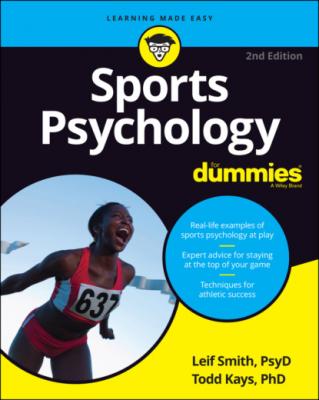Sports Psychology For Dummies. Leif H. Smith
Читать онлайн.| Название | Sports Psychology For Dummies |
|---|---|
| Автор произведения | Leif H. Smith |
| Жанр | Спорт, фитнес |
| Серия | |
| Издательство | Спорт, фитнес |
| Год выпуска | 0 |
| isbn | 9781119856016 |
Burnout: Because sports typically are year-round and athletes are specializing in one sport earlier in their lives and playing that one sport exclusively, it’s natural for them to become bored and disenchanted occasionally. It may be time for you to get away from your sport, even just for a few days. Try playing another sport for a few days — run if you’re a swimmer, swim if you’re a runner, shoot hoops if you’re a tennis player, play golf if you’re a basketball player, and so on. Just getting some time away from your sport can help increase your motivation. (For more information on combating burnout, see “When you’re burned out,” later in this chapter.)
You may be experiencing a drop in motivation for some other reason. Maybe you aren’t improving as you’d hoped. Maybe you aren’t getting the playing time you want. Maybe your team is losing and the whole team is down. Or maybe you have a poor relationship with your coach. The solution to all these issues is to acknowledge them and then assess what you do and don’t have control over, focusing on what you can control and setting aside what you can’t.
Building an effective motivation plan
To build your own motivation, you need a plan. And to come up with a plan, you need to take a little time to figure out where your motivation currently sits. To do this, take some time and ponder the following questions:
Why do you play this sport? (Love of the game? Love of competing? You are good at it?)
If you play because you love the sport, at what level is your “love”? (1-10, with 1 being low and 10 being high.)
If you are playing because of something other than love of the game, is this a reason that will continue in the coming years?
What are some internal things you can do or think about to motivate yourself and move your love of the game and motivation levels higher on your 1-10 scale?
Maximizing Your Motivation: How Small Sparks Can Become Bonfires
Motivation is a complex mix of multiple issues, so you’ll be addressing and adjusting it throughout your career. In this section, we give you some strategies for improving your motivation — you can pick and choose different strategies at different times, and see what works best for you.
Being completely honest with yourself
One of the most frightening but motivating tasks you can undertake is to be honest with yourself about your current level of motivation, why you are playing sports, what your goals are for your sport, how good you actually are, what skills need improvement, your mental toughness, areas in which you simply are not that good, and so on. Being completely honest may be painful, but motivation always increases when you clear away the excuses.
Thinking about why you play the game
Throughout the season, revisit your reasons for participating in your sport. The season can be long, and it’s natural to wonder why you’re putting yourself through the physical and mental challenges. Many sports these days are year-round, making it even more important to assess your motivation levels.
Being curious and non-judgmental
Curiosity is a wonderful mindset that can help you maintain your motivation levels in sports. Being curious means looking at your sport participation like a child would — asking questions (How can this help me? How can I get better today? What can I do to help my team this week?) and looking for powerful answers. Sports these days tend to be major commitments and they seldom have off-seasons. This means it is very important to avoid overtraining, overthinking, overanalyzing, and burning yourself out motivation-wise. Being curious helps you keep the right mindset. When you ask yourself powerful, motivating questions, you’ll get powerful, motivating answers!
Another mindset to cultivate is that of being non-judgmental. This means not being so hard on yourself for your mistakes and failures. (We cover this more extensively in Chapter 12, where we discuss the tool of mindfulness!) It also means trying to avoid the trap of comparing yourself to others and always looking for negatives in your game. Try to keep a non-judgmental mindset, and you’ll be happier and more motivated in the long run.
Focusing on tasks, not ego
Sports psychologists like to talk about task orientation and ego orientation. If you’re focused on the tasks of getting better — on those things over which you have control — your motivation will grow. Task orientation is common among people who have high internal motivation. Ego orientation, on the other hand, is more focused on the external rewards of competing, such as winning, money, success, fame, and media exposure. Most professional athletes have a combination of both ego and task orientation, with a greater emphasis on task orientation.
As an athlete, you’ll feel more motivated when you’re confident in your skill set and believe in your ability to continue to improve. And you’ll feel more motivated to practice and compete when you’re performing well or when you feel confident in your athletic skills and potential. This confidence occurs regardless of whether you receive any external rewards, such as praise from your coaches or parents.
Remember also that accomplishing small tasks — which we discuss in Chapter 3 — can be very motivating. At times, training for 3-6 months can feel like a long time and your motivation may wax and wane. However, if you focus on accomplishing tiny, “baby” steps today, your motivation and confidence grow. Go inch-by-inch and eventually you will go a mile.
Finding ways
